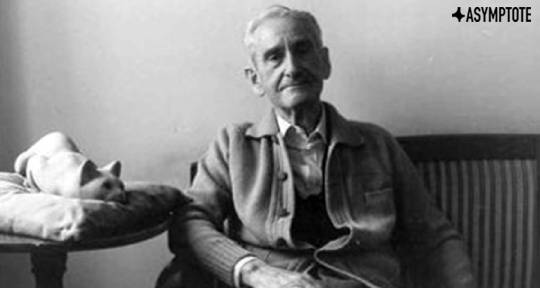

However, Saba omits a key figure in this essay, an individual who profoundly shaped his literary ambition and whose presence lurks throughout most of his finest writings. To some extent, making poetry for Saba became a way to lay claim to a cultural background that he wanted to make his own.

Like other triestini writers, such as Italo Svevo (1861-1928) and Scipio Slataper (1888-1915), Saba wrote in Italian with the ultimate ambition of participating in the Italian literary tradition. Throughout his career, Saba was preoccupied with the ambitious goal of belonging to this pantheon of authors, a concern that stems from his biographical circumstances he was born in Trieste at the end of the nineteenth century, when the city was still a peripheral territory of the decaying Austro-Hungarian Empire. These names represent for Saba the “filo d’oro della tradizione italiana,” the golden thread of the Italian literary tradition, at the end of which he wished to place his own work. Saba also briefly names the Italian translation of Shakespeare’s sonnets, as well as D’Annunzio’s Poema paradisiaco and, lastly, Giosuè Carducci. He mentions Leopardi’s songs, the lyrical poems of Parini, Foscolo, Petrarca, and Manzoni.

Saba describes the dusty rooms of the public library where he first read the works that most directly contributed to his literary formation. In a short essay entitled “On the Public Library, or On Glory” (1957), the Italian poet Umberto Saba tells his daughter about the poets that he loved in his youth. One of Saba’s most celebrated essays was written to inform his daughter about the books from the local public library which he had enjoyed reading as a boy, most of which are available on the shelves of the TU Library.Īs Assistant Professor Mattia Acetoso, who teaches Italian at Boston College, USA, wrote: Trieste is also known as City of Science, City of the Three Winds, Vienna by the Sea, and City of Coffee. It is considered one of the world’s literary capitals and melting pots, because of its diverse ethnic groups and religious communities. Trieste, where Central Europe meets the Mediterranean Sea, is almost a character in the story. Ernesto adopts leftist political views, partly to annoy his employer. The novel is set in 1898 in Trieste, where Ernesto, a sixteen-year-old apprentice clerk to a flour merchant, lives with his mother and aunt. It includes details about the title character’s friendship for a violinist and his attachment to his native Trieste.

He lived and worked in the Mediterranean port of Trieste, Italy, at a time when it was the fourth largest city of the Austro-Hungarian Empire.Īlthough Ernesto is fiction, it describes some real-life episodes in Saba’s life. In addition to writing poems, Saba maintained a day job as a seller of old books. TU students who enjoy Western European literature may also wish to look up Saba’s poems in the The FSG book of twentieth-century Italian poetry: an anthology edited by Geoffrey Brock, which is available for loan at the Pridi Banomyong Library, Tha Prachan campus. The TU Library also owns a different English language edition of Ernesto translated from the Italian by Estelle Gilson. The edition in the Charnvit Kasetsiri Room was translated from the Italian by Mark Thompson. It is shelved in the Fiction section of the Charnvit Kasetsiri Room in the Pridi Banomyong Library.Įrnesto is a novel by the Italian poet Umberto Saba (1883–1957). These items are shelved in the Charnvit Kasetsiri Room of the Pridi Banomyong Library, Tha Prachan campus.Īmong them is a book useful for TU students interested in literature, European history, translation studies and related fields. They are part of a special bequest of over 2800 books from the personal scholarly library of Professor Benedict Anderson at Cornell University, in addition to the previous donation of books from the library of Professor Anderson at his home in Bangkok. Through the generosity of the late Professor Benedict Anderson and Ajarn Charnvit Kasetsiri, the Thammasat University Library has acquired some important books of interest for students of Association of Southeast Asian Nations (ASEAN) studies, political science, literature, and related fields.


 0 kommentar(er)
0 kommentar(er)
